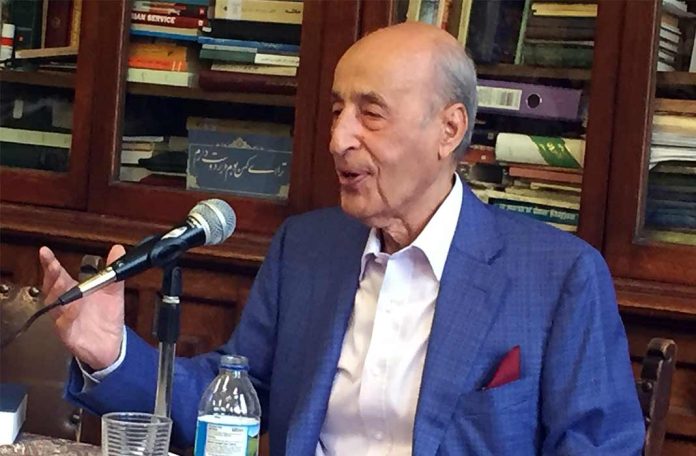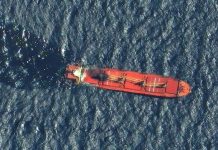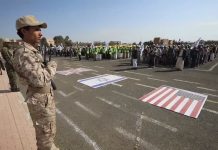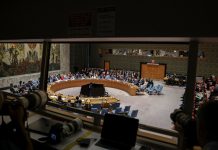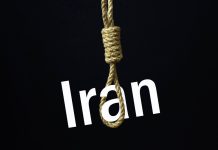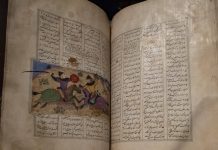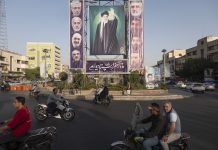By Nazanine Nouri
Lord David Alliance CBE, the Iranian-born British textile magnate and philanthropist, passed away at the age of 93 on July 18th. For more than half a century, he was one of Britain’s foremost industrialists, and a pioneering force in the country’s textile industry.
Lord Alliance built one of the largest textile businesses in the world through acquisitions. This was at a time when the British textile industry, once one of the main drivers of the Industrial Revolution, was in terminal decline.
“But where others saw a sunset industry, David Alliance saw an opportunity,” wrote his close friend, Lord Mandelson, in the foreword to Lord Alliance’s book “A Bazaar Life: The Autobiography of David Alliance.” “For a glorious period in the 1970s and 1980s, he seemed to have turned back the tide, basically through his ingenuity, hard work and sheer determination.”
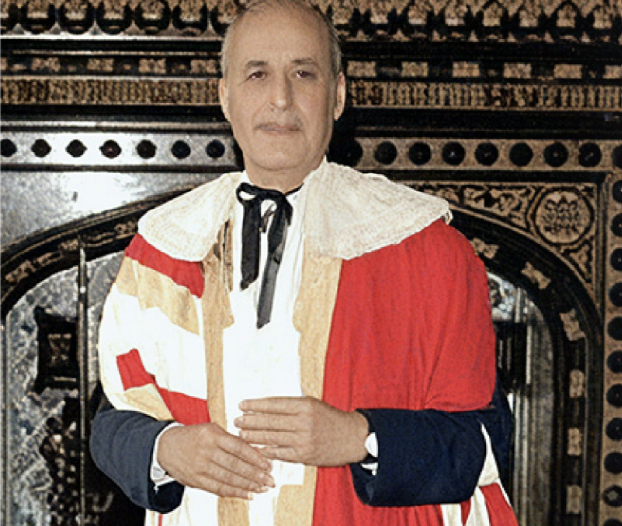
At one point, Lord Alliance controlled the biggest textile company in the Western world; he was also the world’s largest manufacturer of sheets and towels. He manufactured in 60 countries, generating revenues of GBP 2.5 billion and employing more than 70,000 people. His company was Marks & Spencer’s biggest supplier for several years in the 1980s and 1990s.
Lord Alliance also acquired a range of businesses throughout his life in precision engineering, mobile phones, TV rental, banking, property, construction, estate agencies, retailing, medical equipment, stationery, fund management, insurance and mail order.
He was bestowed the highest-ranking Order of the British Empire – becoming Commander of the British Empire – and was known thereafter as Lord Alliance of Manchester CBE, a title which he was infinitely proud of. “There is no greater honor than to end my days as Lord Alliance of Manchester, CBE,” he wrote in his autobiography, which was published in 2015.
He also received a knighthood from Queen Elizabeth II at Buckingham Palace which he remembered as the proudest day of his life. “For a Persian boy who had wandered the streets of Manchester with only a few shillings in his pocket, and who had spent the first years in fear of being thrown out because of his lack of a visa, it was a wonderful feeling to be recognized – and accepted – in this way by my adopted country,” he wrote in the final chapter of his book.
He discovered years later that he had received both his CBE and his knighthood thanks to letters written by trade unions to government ministers — such as the one written by Joseph King, the General Secretary of the Amalgamated Textile Workers’ Union in 1981.
“I know of no one during the whole of my lifetime who has devoted so much time and personal effort to this industry,” King wrote, “the results of which have been of considerable benefit to the people I represented for so many years.”
David (Davoud) Alliance was born in 1932 into a Jewish family in Kashan, an ancient oasis town situated halfway between the holy city of Qom and Isfahan, set on a vast plateau of steppes and salt deserts. His mother died when he was six, and he was raised by his father and three older sisters.
In 1945, a year after the family had moved to Tehran, and when he was only 13, he was taken out of school by his father (a relatively prosperous merchant who had traded in dyestuffs in Kashan before becoming a moneylender in Tehran) to work as an apprentice for a textile wholesaler in the bazaar. Alliance would go for years without forgiving his father, until he realized years later that he had done what he believed was right for his son. From that moment on, he would never depend on anyone but himself.
Within six months, he was hired by another textile wholesaler who was impressed by his diligence. Working six days a week, starting before the markets opened and finishing late, young David rapidly learned the tricks of the trade: determining the quality and value of a fabric by seeing it or touching it, understanding why certain colors sold better at different times of the year, putting the interests of the business first, and making sure the customers were always satisfied.
“Everybody haggled for even the smallest thing, a habit I picked up quickly and never lost,” he recalled in his autobiography. “The Grand Bazaar of Tehran was a microcosm of the global world of business today, and I was fortunate enough to have been exposed to it in my most formative years.”
By the time he was 16, he was the highest wage earner of his generation in the bazaar, with a solid track record, so he set off on his own to establish a successful wholesale textile business with his cousin.
In 1950, when he was just 18, he left his homeland for Manchester, which at the time was attracting a growing number of Jewish merchants as the dominant center of the world’s textile industry. There, he joined five of his maternal uncles, who had left years before and had built successful lives. He saw an opportunity for himself as a young “Bazaari” [Bazaar merchant] with one foot in Britain and the other in Iran.
Arriving with just 14 pounds sterling in his pocket (having funded his entire trip himself), he made a meager living, sometimes sleeping on the streets, as he could afford neither rent nor food. He tirelessly knocked on the doors of Manchester warehouses and Lancashire mills to buy up their unwanted stock — end-pieces of fabric or odd lengths of shirting sold cheaply as seconds — which he then sold on or shipped to Iran. He was determined to make it on his own, and besides attending the traditional Shabbat dinners, he kept a distance from his family.
By 1956, at the age of 23, he was married to his cousin Alma and had a home and a business of his own: Thomas Hoghton’s. The Lancashire cotton mill (which he had known from his early days) was facing closure before he turned it around and made it profitable, saving every job in the process.
For Alliance, this was one of the proudest achievements of his life. “It showed how determination, inventiveness and the refusal to accept defeat can triumph even over the most adverse of circumstances,” he wrote.
At its peak, the British textile industry, centered in Lancashire, had dominated half of the world market. The Sieffs of Marks & Spencer and the Rothschilds had originally been based in Lancashire, and India and China had been the biggest consumers of British-made fabric.
But by the late 1950s, hundreds of small family-owned cotton mills in Lancashire were on the market, waiting to be taken over. Cotton mill owners were surrendering without much of a fight, as cheap, subsidized, imported fabric was flooding Britain from India, Hong Kong and Pakistan, and export markets were disappearing at a frightening pace. Polyester-cotton blends from the US, Europe and the Far East were also making big inroads, at the expense of the old-fashioned cotton products which the Lancashire mills still depended on.
In the decade that followed, Alliance acquired more than 200 companies, often working on two or three acquisitions at a time. “My little empire soon became a maze of small companies, and only I knew what was in them and where everything was,” he wrote. “I kept it all in my head, compensating for my lack of education with a memory which filed away even the most obscure of details.”
In the meantime, he and his wife Alma welcomed the arrival of their two children, Graham and Sara. What he loved more than anything was to be home and spend time with them, telling them stories about his life in Kashan and the bazaar.
By the early 1970s, corporate takeovers were all the rage, and Lord Alliance became a master of them. Companies were bought and restructured and parts of them were sold within a few months, with the goal of achieving greater efficiencies and scale. Alliance took very little money out, never rewarded himself extravagantly, never paid out huge dividends or capital repayments and preferred to reinvest in the business.
“I was sometimes called an asset-stripper, because I bought so many companies and had to close parts of them down in order to save the rest, but it was never true,” he wrote in the preface to his book. “I learned early on that you don’t succeed by breaking things. Far from stripping assets, I invested hundreds of millions in building the most modern plants in the world, which were so efficient they could turn out a shirt in a sixth the time it took in China.”
As Lord Mandelson recalled in the book, “perhaps the single most gripping episode” in Alliance’s life was his role in the successful Israeli operation to airlift the Jews out of Ethiopia. Given his close ties with the upper echelons of the Israeli government, Alliance got involved in helping the Ethiopian Jews – known as the ‘Falasha’ [immigrant] or Beta Israel, who, for centuries, had lived in the mountain highlands in northern Ethiopia – emigrate to Israel, the community having been officially recognized as Jews in 1975 under Prime Minister Yitzhak Rabin.

In 1977, Prime Minister Menachem Begin came up with a plan for Lord Alliance to set up a legitimate textile engineering company in Sudan, through which an escape route was organized in strict secrecy. That route allowed the evacuation of thousands of Ethiopian Jews who had fled the war and famine and were living in refugee camps. The company was manned by Israeli agents posing as textile engineers and salesmen to supply machinery to the Sudanese mills.
The system worked well: Some 8,000 Ethiopian Jews emigrated to Israel between 1977 and 1984, and another 12,000 were airlifted by the Israelis (Operation Moses) in the three years that followed, after which the Sudanese office was closed.
Alliance was then involved in negotiating the transfer of those remaining in Ethiopia to Israel with Ethiopian President Mengistu Haile Mariam in exchange for an undisclosed sum of money. Operation Solomon was launched in May 1991 country — and airlifted 14,310 Ethiopian Jews back to Tel Aviv.
Lord Alliance separated from his wife Alma in 1980, and lived mostly on his own in a hotel in London. The couple had drifted apart over the years, as he had become ever busier, his company had grown and his acquisitions had become more complex.
He remarried in October 1982. His second wife, Homa, was the daughter of a distant cousin from Kashan whom he met in extraordinary circumstances in 1978, on one of his last visits to Tehran, when he was caught in traffic and late to an appointment with the Shah.
“In these years, I saw the Shah regularly, mostly in his palace, and liked him as a person,” he wrote. “I also admired him for what he and his father had done for Iran, and particularly for my community and family, who had gained their emancipation and, like so many Jews as well as ordinary Iranians, had prospered under the Pahlavi rule.”
On that day, as he was on his way to see the Shah, he found himself stuck in a one-way street and blocked by a bank which had been set on fire by demonstrators. Seeing two ladies (Homa and her mother) standing outside their home, he asked if he could use their phone to make an urgent call, not knowing that they were, in fact, distant cousins from Kashan.
The family emigrated to Israel in 1980, but Homa was determined to go to the US to complete her studies and contacted Lord Alliance to help her obtain an American visa. She was 23 when they met. They married four years later, and their son Joshua was born seven years afterwards.
The couple separated in the early 1990s, before getting back together for a time after Lord Alliance was diagnosed with pancreatic cancer in 2006. (He had been diagnosed with prostate cancer in 1999 and had undergone radiotherapy treatment, but only shared that information with his first wife Alma and his business partner.)
Lord Alliance’s career in textiles ended after 49 years when he stepped down as chairman of his group on July 21, 1999.
In 2015, the world-renowned Manchester Business School was renamed the Alliance MBS, in recognition of his generous donations and his longstanding relationship with the institution. Over the years, he also supported several charitable organizations in Britain, Iran and Israel, many of them involved in medical research.
Lord Alliance hoped to be remembered for more than just his deal making.
“I try to say to young people today that the most important asset they will ever have is not money in the bank,” he wrote in the book’s final chapter, “but their own human capital, the character traits they are born with, and the qualities and virtues acquired along way – including, if we’re lucky, judgement and a little wisdom.”

“I passionately believe that anyone can succeed at whatever they want to – if they put their heart and soul into it,” he added. “This has been the most fundamental principle of my life.”
He dedicated his autobiography to his first wife Alma, who, he wrote, “remained his best friend, guide and confidante.”
Lord Alliance leaves behind a remarkable legacy in the textile industry, and an indelible mark in the hearts of all of those he touched.

